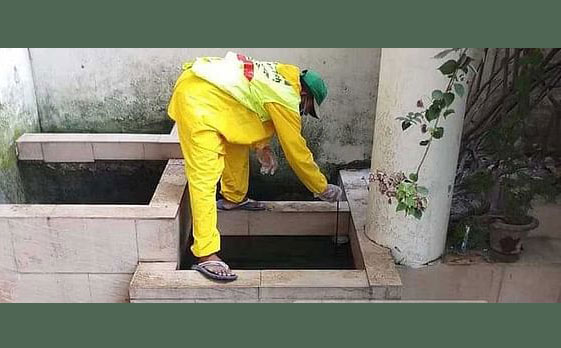
Published :
Updated :

More than 4.0 per cent of the households in Dhaka are beset with Aedes aegypti mosquitoes that carry dengue virus, according to a study carried out by the Directorate General of Health Services.
The findings of a post-monsoon survey conducted by the directorate’s National Malaria Elimination and Aedes Transmitted Disease Control Programmes were announced at Mohakhali’s Institute of Public Health on Thursday.
A survey was carried out on 3,150 homes across 108 wards under the Dhaka city corporations from Jan 26 to Feb 4. Aedes mosquitoes were found in 127 houses, 4.03 per cent of the homes covered.
Among the houses where the species of mosquitoes were found, 39.8 per cent were multi-storied and another 32 per cent under construction, according to the study, reports bdnews24.com.
It found more Aedes mosquitoes in Dhaka South city areas -- 4.18 per cent -- in comparison to Dhaka North -- 3.8 percent.
Breteau Indices were used to calculate the presence of larvaes in some areas.
An area is considered at risk of spread of dengue when the index hits 20 or above. None of the Dhaka North areas crossed the risk threshold as Ward no. 3, 23, 26 and 38 measured a bit above 10.
However, Ward no. 12 of Dhaka South reached 24.14 on the Breteau Index. Other wards, including 2, 16 and 26, measured above 10.
Kabirul Bashar, professor of zoology department at Jahangirnagar University who attended the programme, said post-monsoon surveys cannot conclusively reflect how much trouble mosquitoes might stir this season. A study in April-May would reflect it better, he added.
“Aedes mosquitoes have a cycle. The cycle in February is no longer there. A fresh cycle starts in April. That will help us figure out what the new trend might be. So a pre-monsoon study must be conducted.”
Ahmedul Kabir, additional director general at the health directorate, said: “Dengue infection raises risks of death. So we need to put necessary measures in place to prevent it. This study will help identify which areas are at risk and prepare accordingly.”
According to DGHS data, as many as 901 people have been hospitalised with dengue fever this year so far while 10 of them died.
Last year, hospitals logged 62,382 dengue patients and a record 281 deaths due to the disease.


 For all latest news, follow The Financial Express Google News channel.
For all latest news, follow The Financial Express Google News channel.